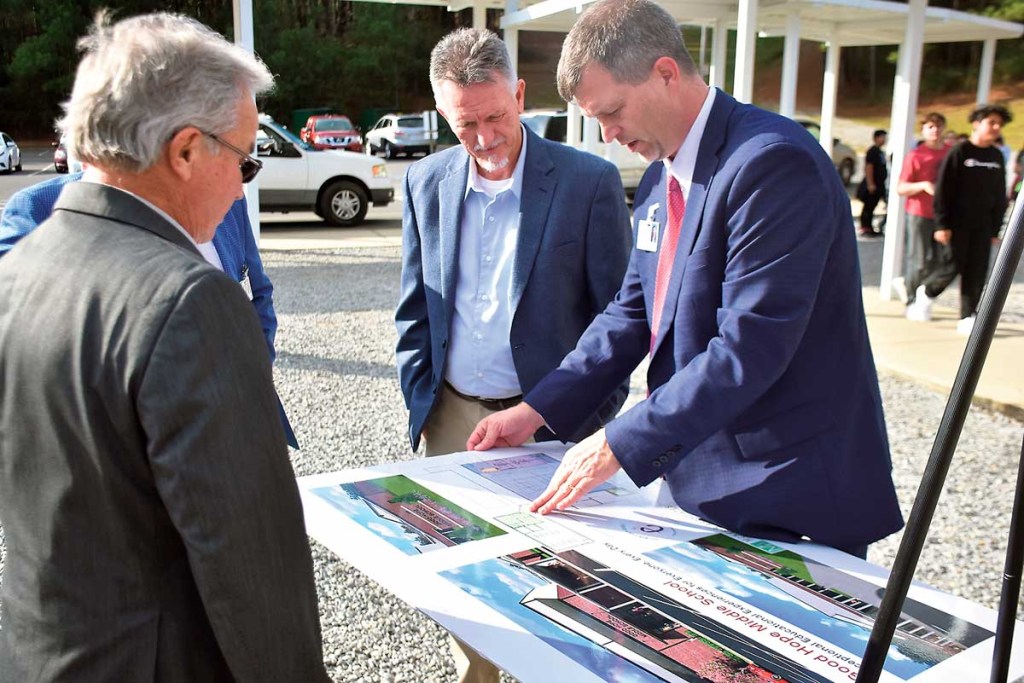Commission strikes agreement sharing online sales tax revenue with county schools
Published 5:00 am Saturday, May 21, 2022

- Cullman County Schools Superintendent Shane Barnette, from right, points out details of the system’s project at Good Hope Middle School to Cullman County Commissioner Kerry Watson and Good Hope Mayor Jerry Bartlett during the December 2021 groundbreaking.
Beginning this year, Cullman County Schools will start taking in a share of locally-generated revenues that the Cullman County Commission collects from the sales tax assessed on retail purchases that county residents make from out-of-state sellers online. It’s the first time since Alabama implemented a uniform system for the borderless collection of internet sales taxes in 2019 that the school system will be receiving any of the funds.
At its regular meeting this week, the Cullman County Commission approved a new revenue sharing agreement with the Cullman County Board of Education. It extends the two entities’ existing sharing setup, already in place by legislative act, that governs the sharing of general sales tax to also cover taxes assessed on online purchases made within Cullman County. The new agreement required no legislative action; rather, it was struck at the commission’s discretion after school officials approached commissioners with the request.
As framed by prior state legislation, the commission’s general sales tax apportionment permits the commission to retain approximately 70 percent of locally-generated sales taxes, while yielding approximately 30 percent to the county school system. The new agreement covering online sales similarly hews to a 70/30 sharing formula, with the school system receiving 30 percent. The commission will deliver the school system its first check reflecting the change this summer.
In unanimously approving the measure, the commission didn’t authorize any new taxes or apportion current taxes in any way that will affect local spenders. Rather, it acknowledged the gradual, ongoing shift away from point-of-sale retail spending and toward online transactions that connect local buyers with sellers who may be hundreds or thousands of miles away — and agreed that it should extend its existing general sales tax revenue sharing setup to the county school system in order to reflect that change.
“We don’t want schools to suffer because more people are buying online,” explained county administrator John Bullard, who provided sales tax data that typifies an overall trend toward increased online spending.
More than seven months into the current fiscal year (which runs from Oct. 1-Sept. 30), Cullman County has collected a combined total of $7,951,257 in sales taxes from both brick-and-mortar and out-of-state internet purchases made locally.
Of that amount, $6,864,704 comes from the general county sales tax (i.e., the sales tax that residents pay on any purchase from a local seller). The remaining $1,082,553 comes from sales taxes assessed through Alabama’s Simplified Sellers Use Tax (SSUT). Mandated by the Alabama legislature to apply to all eligible online transactions from January of 2019 onward, SSUT is the state’s online assessment program that takes a flat eight percent in sales tax from every dollar Alabama consumers — including Cullman County residents — sent to out-of-state internet retailers.
The county commission’s agreement with the school board isn’t retroactive and doesn’t include taxes generated earlier this year before the present fiscal-year quarter. But applying the 70/30 sharing agreement to the county’s year-to-date tax data affords some idea of how much money the school system can expect to see from the change.
Applied to the county’s $1,082,553 year-to-date revenue taken from SSUT online sales taxes, for example, the new sharing agreement would see $324,766 of that amount diverted to Cullman County Schools, while the county commission would retain the remaining $757,787 as General Fund revenue.
Extrapolated over a full twelve months, that puts the school system on pace to begin taking in additional revenues approaching half a million dollars per year, even as it takes a 30 percent bite out of the county commission’s SSUT revenue stream — though Bullard points out that the amount the school system receives could increase yet further, if local residents continue the overall trend of looking to the internet as a place to buy goods and services.
Municipal budget planners, in fact, have found it tricky to keep pace with consumers’ growing preference to shop via the internet. The county commission’s current fiscal year budget, which took effect on Oct. 1 of last year, projected the commission would receive SSUT revenues of $850,000 for the entire fiscal year. But year-to-date revenue totals show local spenders surging far beyond that estimate: With five months yet remaining in this fiscal year, SSUT taxes already have blasted past that full-year projection, ringing in (so far) at the $1,082,553 SSUT revenue figure.
Balancing online sales tax revenues against their local brick-and-mortar counterparts also has been tricky. The commission’s same current fiscal year budget projects a twelve-month general sales tax revenue haul of $12,356,000 by Sept. 30, and the $6,864,704 collected so far this year is more or less on track to meet that estimate. Its even-keel pace, though, contrasts sharply with the marked surge in this year’s local online spending.
For the school system, the new agreement means welcome revenue that school officials say will go toward needed capital improvement projects.
“Thanks to this agreement, you will see a lot more work across our school system, in addition to the various improvements which are already underway,” Cullman County Schools superintendent Dr. Shane Barnette said in a press release, which noted that the revenue will help pay for “Safe, Secure, and Well-Maintained campuses” — a goal identified in the school system’s recently-approved strategic plan.





